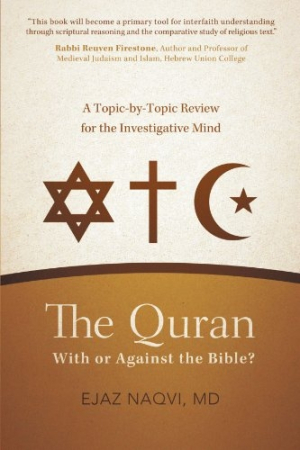The Quran
With or Against the Bible?
- 2012 INDIES Finalist
- Finalist, Religion (Adult Nonfiction)
Ejaz Naqvi seeks to bridge the yawning gap that zealots have created between Muslims and non-Muslims. The Quran: With or Against the Bible? is not meant to stir up controversy; it is intended to squash it. Naqvi’s primary audience may be Christians and Jews, but he speaks to fellow Muslims, too, “a significant number” of whom have many “misconceptions about the Holy Quran,” he argues. Misconceptions of Islam’s holy book teachings, writes Naqvi, have proliferated because most people, even most Muslims, “have never read it,” let alone read it in its entirety. “Second-hand” exposure to the Quran is not limited to Westerners who base their views on the comments of pundits and politicians, he believes, but it is common among Muslims who are fed only selected passages by preachers and rabble-rousers, whose education in the faith is often incomplete.
In a perfect world, explains the author, everyone would read the Quran in Arabic from cover to cover. The next best thing is for people to read it in their own language. Naqvi believes that if people did so they would grasp the goodness of this “guide”; they would see how much it has in common with the scriptures and traditions of the Judeo-Christian world.
Naqvi is an American medical doctor and a “born-again” Muslim, a unique combination that allows him to speak to a Western audience in ways someone born overseas in a culture of Islam might find difficult. All but the last chapter are organized like college lectures, complete with a summary of points to study and “to ponder.”
Of the six sections into which these chapters are grouped, only the last one contains controversial material. That this is limited to one section is meant to show that the three “Abrahamaic books” (Old and New Testaments, Quran), as he puts it, have more in common than not. Naqvi acknowledges that the Bible is stronger as a history, whereas the Quran, which is far shorter, is more about the “moral of the story.”
A portion of almost every page is given over to quotes, citations, or summaries of thoughts from one of the holy books. The similarities between the Bible and the Quran are made quite apparent in this way, whether it is the story of Mary or descriptions of the afterlife in Paradise.
What controversial material there is here is limited to two of the four chapters in part six—on Jihad and the role of women. Naqvi demonstrates that on the latter point the Old Testament and the Quran are strikingly similar. He also notes that while modern Western culture and its laws may not always “correspond” to the guidelines of the holy book, “the scriptures do not encourage people to ‘take the law into their own hands’ if there is a discrepancy between the divine law and the law of the land.”
This book should be required reading for anyone seeking to find common ground, rather than division, through faith.
Reviewed by
Mark McLaughlin
Disclosure: This article is not an endorsement, but a review. The publisher of this book provided free copies of the book and paid a small fee to have their book reviewed by a professional reviewer. Foreword Reviews and Clarion Reviews make no guarantee that the publisher will receive a positive review. Foreword Magazine, Inc. is disclosing this in accordance with the Federal Trade Commission’s 16 CFR, Part 255.

